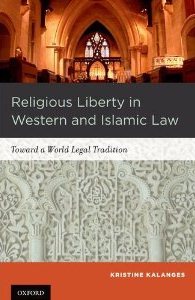Religious Liberty in Western and Islamic Law

Religious Liberty in Western and Islamic Law: Toward a World Legal Tradition
Kristine Kalanges
Oxford University Press 2012
In Religious Liberty in Western and Islamic Law: Toward a World Legal Tradition, Kristine Kalanges argues that differences between Western and Islamic legal formulations of religious freedom are attributable, in substantial part, to variations in their respective religious and intellectual histories. Kalanges suggests that while divergence between the two bodies of law challenges the characterization of religious liberty as a universal human right, the “dilemma of religious freedom” – the difficult choice between the universality of religious liberty rights and peaceful co-existence of diverse legal cultures – may yet be transformed through the cultivation of a world legal tradition. This argument is advanced through comparative analysis of human rights instruments from the Western and Muslim worlds, with attention to the legal-political processes by which religious and philosophical ideas have been institutionalized.
Features
- Weaves together international and comparative law, religion, international relations, comparative politics, and legal history to illuminate and address the theoretical and practical dimensions of a significant human rights problem.
- Reframes the religious human rights debate as one that must account for comparative religious context (i.e., not just the contribution of Islamic law to Muslim states, but also the Judeo-Christian contribution to the Western legal tradition)
- Suggests how the cultivation of a world legal tradition could constitute a new type of foundational consensus based on respect for the religious foundations of law, thereby increasing the possibility that practical consensus on religious liberty, and perhaps other human rights issues, could be achievable and lasting.